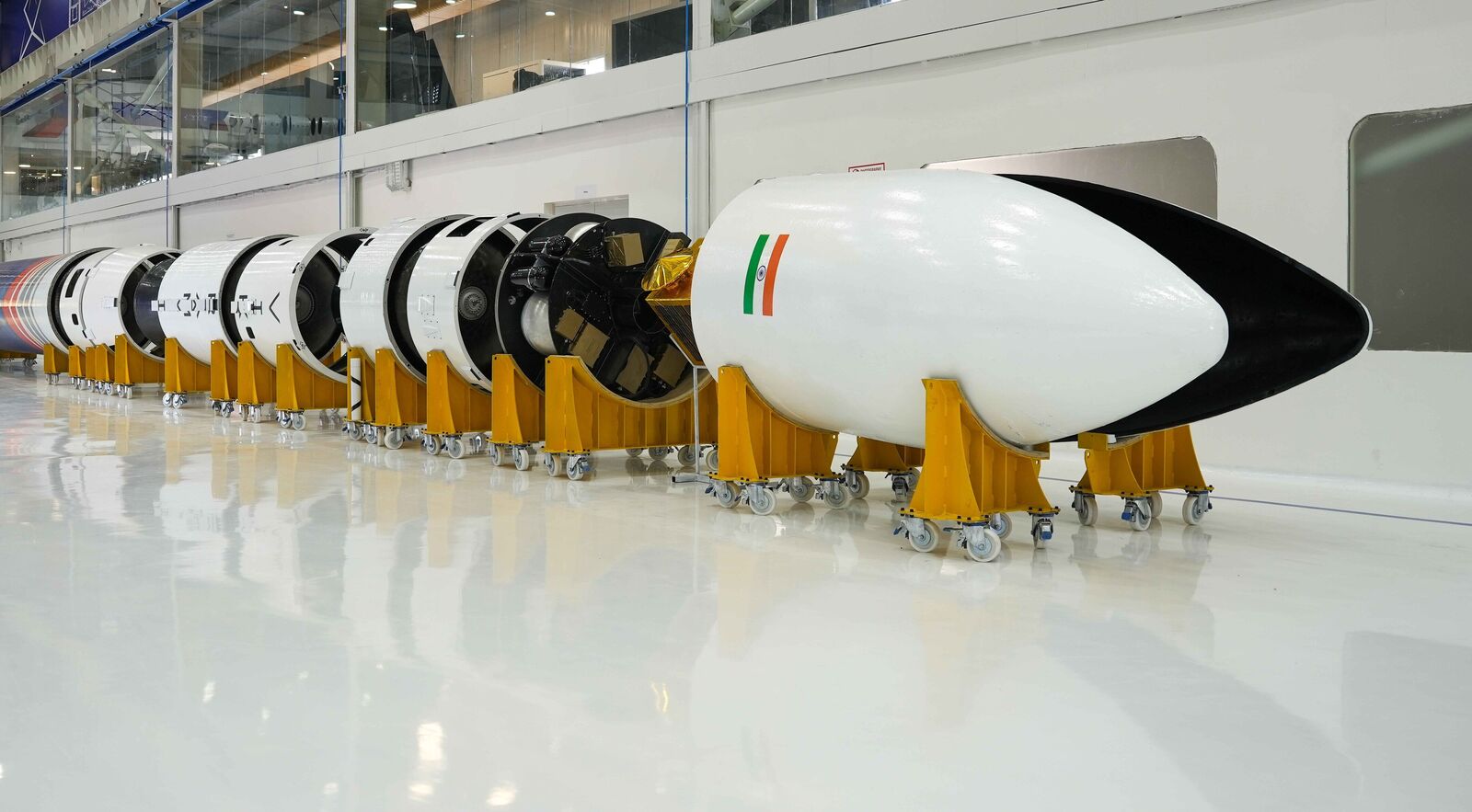So far, only the government-run Indian Space Research Organisation has launched rockets to put satellites in orbit. However, Isro’s main mandate is research and development, and its frequency of launch operations is limited.
Now, three years after India opened up its space sector to private companies, Hyderabad-based Skyroot Aerospace is targetting its first full-scale commercial satellite launch mission by January.
Skyroot, co-founded by two former Isro scientists, is targetting one launch every three months next year, and one every month from 2027. Each satellite launch mission is expected to generate the company nearly $5 million, according to Skyroot chief executive Pawan Chandana.
“Making a single rocket takes about eight to nine months, and costs us $2–3 million. As we build scale, this cost and time will both reduce. Our revenue expectation per launch is about double that of the cost of making a rocket,” said Chandana. “We’ll start realizing operating revenue from the [first] launch itself, which will have a couple of paying satellite customers onboard.”
Skyroot’s rocket launch will be a major milestone for India’s space sector. It would allow government bodies such as the ministry of defence as well as companies in fields such as broadcasting and data analytics the ability to launch satellites from within India itself, and at a fraction of the cost.
While SpaceX, the Elon Musk-owned private space company, has been able to drastically lower the cost of rocket launches, it has a long wait list of almost two years—making it difficult for companies to use its services.
“… The SSLV (Isro’s Small Satellite Launch Vehicle) will cater to a different set of clients that will approach the government consortium for space launches. But on the private front, it will be a question of which launch provider has the more superior, more reliable technology,” Chandana said. “Even though there is competition, there’s also a lot of demand in the market—all operational private space launchers are booked out for the next two years already. That’s where we’d come in.”
Key Takeaways
- Hyderabad-based Skyroot Aerospace, backed by Temasek and GIC, is preparing India’s first private commercial rocket launch within three months, aiming to conduct one launch every three months next year.
- A successful mission would open space access to Indian companies and government agencies, letting them launch satellites domestically at lower costs and without long global wait times.
- However, engineering delays, funding cycles, and limited domestic demand for satellite launches could test Skyroot’s path to profitability and India’s broader push to privatize its space sector.
Skyroot’s take-off
Incorporated in 2018, Skyroot Aerospace has raised $95.5 million ( ₹850 crore) across five tranches from investors including Singapore-based investment firm Temasek and the country’s sovereign fund GIC.
Chandana, a thermal science and mechanical engineering graduate from the Indian Institute of Technology–Kharagpur, began his space journey with Isro in September 2012. During his six-year stint there, he contributed to India’s heavy rocket launcher—which was used in the landmark Chandrayaan lunar missions. It was at Isro that Chandana met his co-founder, Naga Bharath Daka.
While Daka left Isro for a three-year stint at US semiconductor design firm Xilinx, the two reunited in July 2018 to begin Skyroot.
Skyroot became India’s first space startup to demonstrate a rocket launch when it sent up a smaller version of its satellite vehicle from Sriharikota in Andhra Pradesh in November 2022.
At the time, Chandana had told Mint that Skyroot aimed to launch a rocket every two months by 2025. But the company has only conducted a solitary suborbital launch since then—meaning that while Skyroot did become the first private company to launch a rocket from Indian soil, its demonstration mission did not go beyond the earth’s orbit and enter outer space.
Building proprietary technology took time, Chandana explained. “… We’re the world’s only active small rocket that has a fast turnaround time, and would be capable of carrying up to five different payloads that need to be injected in five different levels of the earth’s orbit. At our size and scale, we’re the only company in the world with such a capability.”
Skyroot is one of only three homegrown rocket-manufacturing entities, alongside Chennai-headquartered Agnikul Cosmos, and Hindustan Aeronautics Ltd’s privatised version of Isro’s Small Satellite Launch Vehicle.
Agnikul conducted its suborbital test launch in May last year—18 months after Skyroot. It has so far raised $41 million in funds from investors including Pi Ventures, Mayfield India, and Celesta Capital.
Delays and challenges
Skyroot’s seven-year journey, however, has not been without challenges. In 2022, its management had projected that the company would become profitable by 2026, with satellite launch missions every two months beginning this year. However, following engineering delays and other challenges, the company now expects to become profitable by March 2028.
“These delays are not unnatural. In space, there are multiple challenges—sourcing of raw materials in many strategic cases takes months. Then, there are engineering challenges, and we need to be absolutely sure that we’ve gotten all calculations accurate in order to avoid any mishaps,” Chandana said.
“Perfecting engineering and production is a challenge, because any failed move would adversely affect the company and the industry alike. A high level of safety and accuracy is what takes time to get right,” he added.

View Full Image
Chandana isn’t wrong. Musk’s SpaceX commenced in March 2002 with a grant from the US’s Defense Advanced Research Projects Agency. It took SpaceX four years to develop its first rocket, Falcon 1, which failed in all of its launch attempts between mid-2006 and mid-2008. SpaceX finally found success in July 2009 with its fifth attempt, when it accurately deployed a Malaysian satellite in orbit.
Today, SpaceX is the world’s most successful space services company. In 2024, it totalled 138 launches—an average of more than two every week. The company is one of the world’s most heavily-funded companies, having raised nearly $6.2 billion.
India has at least 200 space-related startups, per estimates by the Department of Space, which runs Isro. At least half a dozen of these startups, including Agnikul, Pixxel, and Digantara, have raised over ₹100 crore from investors.
India’s space sector is projected to surge to $44 billion by 2033 from about $8 billion now if the government’s privatisation push is successful, Jitendra Singh, Union minister of state for the Department of Space, said during the India Mobile Congress event earlier this month.
A billion-dollar opportunity
While Skyroot generated a small revenue of about ₹50 lakh from its suborbital launch in 2022, it had no operating revenue in 2023-24, per the company’s financials filed with the ministry of corporate affairs and accessed via business intelligence platform Tofler.
Chandana expects that to change in the ongoing financial year with the company’s first satellite launch mission (he didn’t disclose Skyroot’s financials for FY25).
“Our hope is that as soon as we start generating operating revenue, we’ll start taking steps toward profitability. The goal is to get there as soon as possible, but definitely within the next two fiscals…,” he said.
In October 2023, a decadal vision released by Indian space promoter body, Indian National Space Promotion and Authorization Centre (In-Space), said that by 2033, India’s space launch services providers would generate $3.5 billion in annual revenue.
“The most recognizable name in space globally is SpaceX, and the first thing people think of when space is mentioned is a rocket. This holds true in India as well, and the first company that is named in conjunction with SpaceX and rockets in India is Skyroot,” said Surbhi Patni Dalmia, director and India head of space consulting firm Novaspace.
“This is because the founders have excellent pedigree, and are running the business with core issues such as control of technology, ‘phase wise’ testing in mind. Based on how Skyroot’s launches fare, the company has every identifier of becoming a multi-billion-dollar space venture out of India, in the not so distant future,” Dalmia added.
Chandana isn’t looking for additional capital right away for the company’s upcoming rocket launches. “We’re well funded for at least the next two to three launches, beyond which we will think about it. But for now, we’re not looking at an immediate funding round—and it is too early to think or talk about public listings,” he said.
Chandana is the primary promoter of Skyroot Aerospace, owning about 56% of the company, followed by Daka, who holds 28%.
“Missed global opportunities”
Skyroot’s delays so far represent “missed global opportunities”, said Chaitanya Giri, space fellow at global think-tank Observer Research Foundation.
“India does not have the kind of rocket launch demand that companies have so far projected. As a result, most demand is likely expected to come from abroad. But this demand isn’t going to come from the US, Russia, or China, which are the most active in space and have ample internal capacities. [It] will come from Iran, Israel, and other such countries, which are big demand generators for small satellite launches. [But] given the current geopolitics, it is difficult to imagine space companies such as Skyroot to see the kind of demand it could have [had] a few years ago,” Giri said.
According to him, India’s private space companies need to be able to pivot to defence- and military-related services, as have France’s Dassault Systèmes SE, and the US’s Lockheed Martin Corp. and Boeing Co. “Even SpaceX is on the verge of being a military launch vehicle resource,” Giri said.
From an engineering standpoint, Skyroot would have to prove its reliability and consistency once it achieves scale, said Narayan Prasad Nagendra, a space industry veteran and chief operating officer of European satellite services firm SatSearch. And from an operations standpoint, he said, the company would have to find enough demand to be able to conduct one launch every month to achieve operational profitability.
“All of these will prove whether Skyroot will be able to realize its true potential,” Nagendra said. “While the projections are there, the current geopolitical [divisions] mean international collaborations for critical technologies are not the same as what it used to be before.”
#Indias #topfunded #space #startup #tees #countrys #1st #private #rocket #launch



